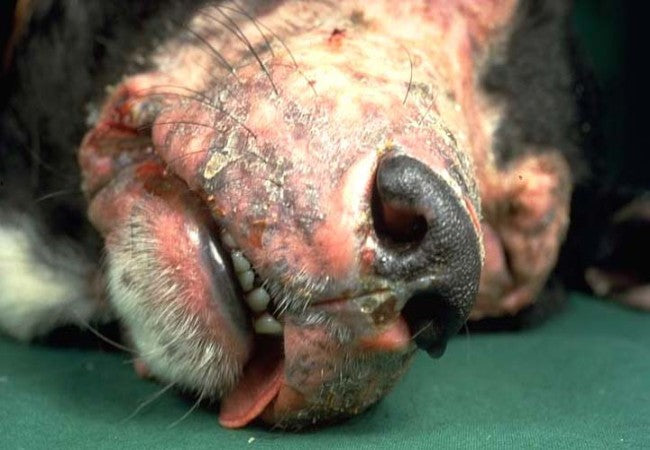Vet Guide to Canine Lupus Erythematosus 2025: Symptoms, Diagnosis & Care 🐾

In this article
Vet Guide to Canine Lupus Erythematosus 2025: Symptoms, Diagnosis & Care 🐾
By Dr. Duncan Houston BVSc
Overview
Lupus erythematosus in dogs is an immune-mediated condition that exists in two main forms: Systemic Lupus Erythematosus (SLE), which affects multiple organs, and the Cutaneous or Discoid Lupus Erythematosus (DLE), primarily targeting the skin of the nose, face, and ears. Although SLE can pose serious systemic risks, DLE—also known as "collie nose"—is generally benign but still requires careful management.
Understanding Systemic Lupus Erythematosus (SLE)
🔍 What is SLE?
SLE is a multifaceted autoimmune disorder wherein the dog's immune system mistakenly attacks its tissues, forming harmful immune complexes that lodge in organs like the kidneys, joints, blood cells, and skin.
⚠️ Common Causes & Risk Factors
- Exact triggers unknown—genetics, infections, medications may play a role.
- Breeds predisposed include German Shepherds, Beagles, Afghan Hounds, Collies, Poodles, and Irish Setters.
- Often diagnosed in young to middle-aged dogs.
🩺 Recognizing SLE Symptoms
Because SLE can involve multiple systems, symptoms vary:
- Kidney: Protein loss, kidney inflammation, increased thirst/urination.
- Joints: Joint pain, swelling, lameness, muscle wasting.
- Blood: Anemia, clotting disorders—leading to pale gums, lethargy, bruising.
- Skin & Nervous System: Rashes, ulcers, seizures, tremors.
- General Signs: Fever, appetite loss, swollen lymph nodes, lethargy.
🩻 Diagnostic Process for SLE
Your vet will conduct a comprehensive evaluation, including:
- Physical exam and full medical history.
- Blood chemistry (liver, kidney), ANA/antibodies, CBC.
- Urinalysis for proteinuria and kidney assessment.
- Imaging (X-rays, ultrasound) to evaluate internal organs.
- Biopsy of skin/joint tissues or cytology for confirmation.
💊 Treating SLE
Treatment is individualized based on organ involvement:
- Immunosuppressants: Corticosteroids (prednisone) are common first-line therapy.
- Additional agents: Azathioprine, cyclosporine, chlorambucil may be used.
- Supportive care: Fluids for kidney issues, transfusions for severe anemia, anti-nausea meds.
- Monitoring: Regular veterinary check-ups with blood work every few months.
📈 Prognosis & Long-Term Management
SLE is not curable but manageable. Treatment goals focus on remission and symptom control. Lifespan depends on disease severity and how well complications are addressed. Typically, dogs require ongoing therapy and check-ups.
Understanding Cutaneous/Discoid Lupus Erythematosus (DLE)
🌞 What is DLE?
DLE is a chronic autoimmune skin condition affecting the basal epidermis, most often on the nasal planum, lips, eyes, and ears. Sun exposure often exacerbates symptoms.
📌 Who is at Risk?
- Breeds include Collies, German Shepherds, Siberian Huskies, Shelties, Alaskan Malamutes, Brittany, and GSPs.
- Affects dogs of all ages; flare-ups frequently follow sun exposure.
🩹 Recognizing DLE Symptoms
- Loss of pigmentation on nose (“smooth, gray” skin), followed by ulceration and crusts.
- Lesions may extend to lips, eyes, ears, and sometimes genitalia.
- Worsens in summer or high-ultraviolet exposure.
- Skin becomes fragile, may bleed or scar.
🔎 Diagnosing DLE
Diagnosis is based on:
- Distinctive clinical signs in typical sun-exposed skin areas.
- Skin biopsy under histopathology confirms basal cell layer inflammation.
- Exclusion of other causes (pemphigus, dermatophytosis, solar dermatitis).
⭐ Managing DLE
Though generally benign, DLE treatment is lifelong:
- UV protection: Avoid midday sun, use dog-safe sunscreen on nose and edges.
- Topical therapy: Corticosteroids or tacrolimus for mild cases.
- Oral supplements: Vitamin E, omega-3 & -6 fatty acids offer anti-inflammatory aid.
- Immunosuppressive agents: Niacinamide + tetracycline/doxycycline. For resistant cases, azathioprine, cyclosporine or low-dose steroids.
✅ Prognosis for DLE
Though treatment must continue lifelong, DLE rarely threatens life. With proper sun protection and therapy, many dogs achieve long-term remission.
Comparing SLE vs DLE
| Feature | SLE | DLE |
|---|---|---|
| Systemic impact? | Yes – multi‐organ | No – skin only |
| Common signs | Kidney, joints, blood, skin, fever | Nasal skin lesions |
| Diagnosis tools | Blood, biopsy, imaging | Skin biopsy, sun‐sensitive pattern |
| Treatment intensity | High (immunosuppressants, supportive) | Mild to moderate (topicals, supplements) |
| Prognosis | Variable, careful monitoring needed | Good, except sun control essential |
Supporting Your Dog at Home
Home Care for SLE
- Administer meds precisely as prescribed.
- Comfortable environment, avoid stress.
- Monitor food intake, hydration, urine output, stool, and behavior.
- Maintain vet appointment schedule for labs and health checks.
Home Care for DLE
- Sun avoidance and protective gear.
- Clean lesions gently, prevent scratching.
- Apply sunscreen and topical therapy regularly.
- Track progress using pet journal or photos.
Nutrition & Lifestyle Tips
- Maintain healthy weight—excess weight worsens inflammation.
- Incorporate omega‑3/6 supplements and antioxidants.
- Choose low-allergen diets to reduce immune activation.
- Encourage gentle exercise to support joints and immunity.
Why 2025 is Different: Advances in Care
- Improved immunosuppressive protocols like cyclosporine and chlorambucil.
- Topical tacrolimus now widely accepted and effective.
- Tele‐vet options like Ask A Vet offer ongoing monitoring.
- Better diagnostics allow earlier intervention and improved prognosis.
How Ask A Vet, Can Help
- Ask A Vet: 24/7 access to veterinary advice on symptom monitoring, medication adjustments, and care tips.
Final Thoughts from Dr Duncan
Lupus in dogs—whether systemic or cutaneous—can be daunting. But with early detection, guided treatment, and thoughtful home care, your dog can live a fulfilling life. In 2025, advancements and telehealth support will make managing these conditions more accessible than ever. Be vigilant, proactive, and partner with your vet to give your dog the quality of life they deserve. 💙
Visit AskAVet.com or download the Ask A Vet app for 24/7 veterinary support and pet care guidance.






